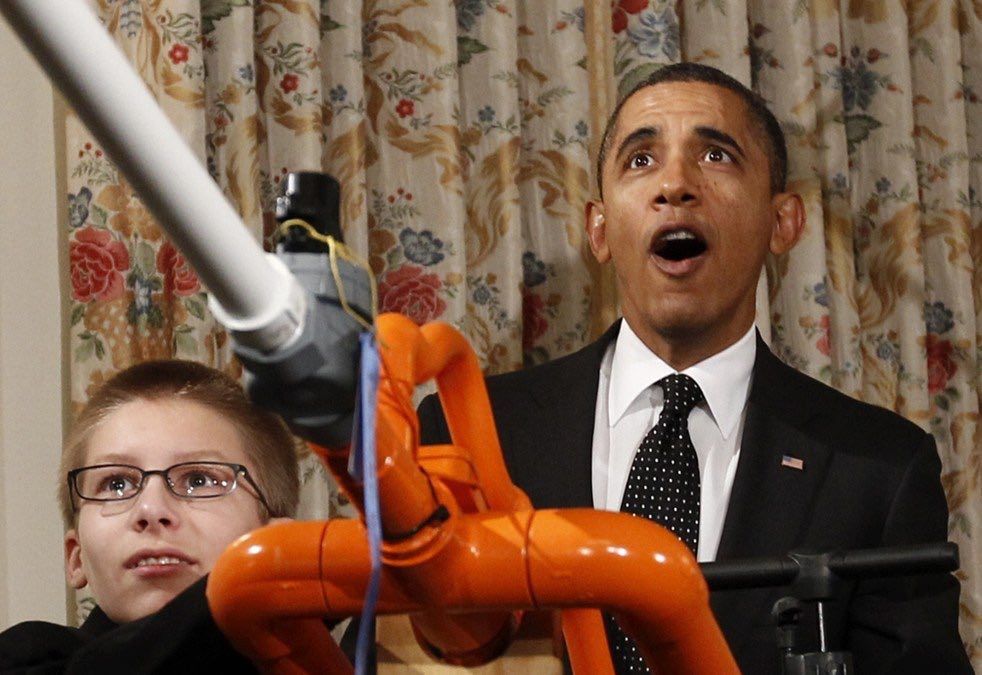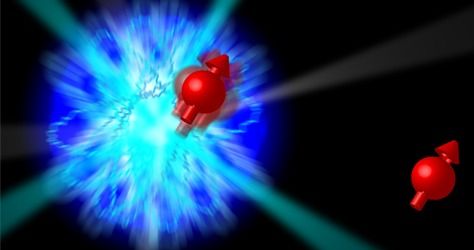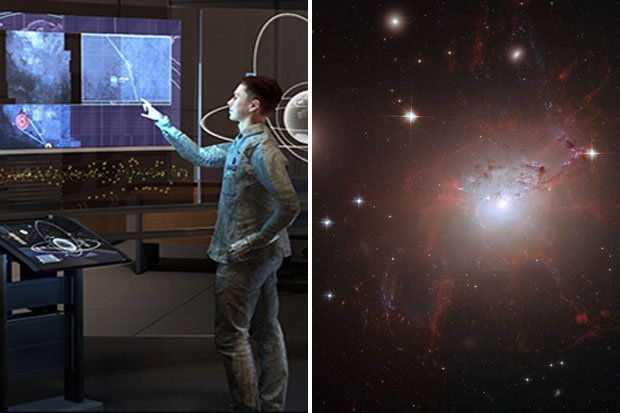Page 11473
Jun 22, 2016
Israel to install its own cyber defenses on F-35 jets
Posted by Karen Hurst in categories: cybercrime/malcode, military
IAF seeking approval to increase number of jets from 33 to 50, with a view of eventually having 75 aircraft.

Jun 22, 2016
White House issues report on President Obama’s impact on science and tech
Posted by Karen Hurst in categories: biotech/medical, education, mathematics, policy, science
In 2009, President Obama pledged to “restore science to its rightful place.” He said, “We will not just meet, but we will exceed the level achieved at the height of the space race, through policies that invest in basic and applied research, create new incentives for private innovation, promote breakthroughs in energy and medicine, and improve education in math and science.”
Today, the White House released an Impact Report listing 100 things that Obama has made happen with the support of many people across research, policy, education, and, yes, maker culture. Here’s the full Impact Report. A few examples from the list:
Jun 22, 2016
Hydrogen-Powered Race Car Runs Laps at Le Mans
Posted by Karen Hurst in categories: energy, transportation
Ford’s GT claimed first place in its class at the 24 Hours of Le Mans on the 50th anniversary of the first of its four outright victories in the 1960s, and Porsche’s 919 Hybrid snatched a second consecutive Le Mans victory.
The unheralded news of this year’s Le Mans race, however, is a hydrogen fuel cell race car completed laps on the Le Mans circuit for the first time in history.
The pioneering car was a Green GT H2, driven around the French track by former Formula 1 driver Olivier Panis during a break in qualifying, and again before the race started.
Continue reading “Hydrogen-Powered Race Car Runs Laps at Le Mans” »
Jun 22, 2016
Particle zoo in a quantum computer
Posted by Karen Hurst in categories: computing, particle physics, quantum physics
Excellent story and highlights how Quantum computers may provide a way to overcome the obstacles around particle physics because QC can simulate certain aspects of elementary particle physics in a well-controlled quantum system.
Physicists in Innsbruck have realized the first quantum simulation of lattice gauge theories, building a bridge between high-energy theory and atomic physics. In the journal Nature, Rainer Blatt’s and Peter Zoller’s research teams describe how they simulated the creation of elementary particle pairs out of the vacuum by using a quantum computer.
Jun 22, 2016
Viewpoint: Hiding a Quantum Cache in Diamonds
Posted by Karen Hurst in categories: computing, internet, nanotechnology, quantum physics
Entanglement purification, a vital enabler for practical quantum networks, has been shown to be feasible with secluded nuclear memories in diamond.
Quantum devices can team up to perform a task collectively, but only if they share that most “spooky” of all quantum phenomena: entanglement. Remote devices have been successfully entangled in order to investigate entanglement itself [1], but the entanglement’s quality is too low for practical applications. The solution, known as entanglement purification [2], has seemed daunting to implement in a real device. Now new research [3] shows that even quite simple quantum components—nanostructures in diamond—have the potential to store and upgrade entanglement. The result relies on hiding information in almost-inaccessible nuclear memories, and may be a key step toward the era of practical quantum networks.
The concept of an interlinked network is absolutely fundamental to conventional technologies. It applies not only to distributed systems like the internet, but also to individual devices like laptops, which contain a hierarchy of interlinked components. For quantum technologies to fulfill their potential, we will want them to have the flexibility and scalability that come from embracing the network paradigm.
Jun 22, 2016
Twittersphere Ridicules Russian Research Plans On Teleportation
Posted by Karen Hurst in categories: biotech/medical, finance, government, internet
In Russia, not all scientific projects get financial backing from the government — but teleportation does.
On June 22, a special interagency working group, along with Russian Deputy Prime Minister Arkady Dvorkovich, discussed the country’s scientific and technological plans drawn up by the Russian Strategic Initiatives Agency.
The document, described in detail by Kommersant newspaper, lists innovations Russian scientists plan to accomplish by 2035. Among them are a Russia-based coding language, a 5G mobile network, “smart” buildings, medical implants — and teleportation.
Continue reading “Twittersphere Ridicules Russian Research Plans On Teleportation” »
Jun 22, 2016
Real star wars? Military sets up space command centre
Posted by Karen Hurst in categories: military, space
I keep earing that the moth balls have came off the old Star Wars program that was in place un Ronald Reagan. Should be interesting.
A MILITARY space station is being set-up to apparently monitor threats to planet Earth in outer space.
Jun 22, 2016
Um promissor remédio antienvelhecimento está prestes a ser testado em humanos
Posted by Bruno Henrique de Souza in category: futurism
Um composto chamado mononucleotídeo de nicotinamida (NMN) retarda o processo de envelhecimento e prolonga o tempo de vida em ratos. Estamos prestes a descobrir se ele tem o mesmo em seres humanos.
Como funciona o processo de envelhecimento do ser humano Cientistas encontram uma área no cérebro que desacelera o envelhecimento
Um ensaio clínico desenvolvido por pesquisadores da Universidade de Washington em St. Louis (EUA) e da Universidade de Keio (Japão) vai testar a eficácia e segurança desse composto.
Jun 22, 2016
Blog Posts for Postnormal Times
Posted by Alexandra Whittington in categories: bitcoin, business, cryptocurrencies
 Last week I dipped my toes in the waters of the Lifeboat blog and shared a link about blockchain technology. If you haven’t heard about blockchain technology yet, you can read about it here, here, here, here, here…you get the picture. Blockchain has tons of potential, and appears to also attract hype and money. All which goes to say, there has been a lot of buzz about its social and economic potential. But there is another aspect of blockchain that deserves some futurist exploration, which is that it signals we live in Postnormal Times.
Last week I dipped my toes in the waters of the Lifeboat blog and shared a link about blockchain technology. If you haven’t heard about blockchain technology yet, you can read about it here, here, here, here, here…you get the picture. Blockchain has tons of potential, and appears to also attract hype and money. All which goes to say, there has been a lot of buzz about its social and economic potential. But there is another aspect of blockchain that deserves some futurist exploration, which is that it signals we live in Postnormal Times.
Postnormal Times (PNT) is a fantastic foresight concept that I will focus on in my upcoming Lifeboat posts. There is an underlying theory to it; Ziauddin Sardar explains the entire idea and how it fits into futures studies. Ziauddin Sardar with John Sweeney have expanded the work into a futurist method called The Three Tomorrows of Postnormal Times. It’s well worth reading up on if you enjoy a futurist approach to your work and studies.
I’m still a beginner, but essentially the idea is that we are now in time is a period best characterized as “postnormal,” meaning that the usual ways of solving problems and making progress have stopped working. Our go-to responses, based on all the previously reliable ways of being in and understanding the world are becoming irrelevant and dysfunctional. The simplest way to introduce Sardar’s concept is the three C’s: complexity, chaos and contradictions. These are the key characteristics of postnormal times which I will be exploring in my posts about technology and humanity. I believe the PNT perspective leads to some useful observations about the direction of society over the next decades.
Back to my blockchain example: the Raketa watch company is implementing blockchain in manufacturing, which will protect inventory from counterfeiting. This development signals PNT because it speaks to the complexity of globalized financial and consumer markets. In this case, so intricate as to require a new, high-tech, largely automated and seemingly fail-proof technology. PNT is evident when previous methods of running a company are no longer sound. Enter blockchain to navigate this new business condition.
Tag: blockchain















